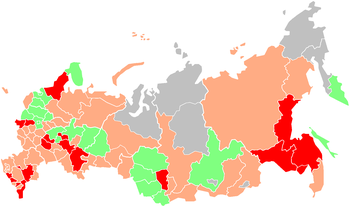Glasnost is a concept relating to openness and transparency. It has several general and specific meanings, including a policy of maximum openness in the activities of state institutions and freedom of information and the inadmissibility of hushing up problems. In Russian the word 'гласность' has long been used to mean "openness" and "transparency". In the mid-1980s, it was popularised by Mikhail Gorbachev as a political slogan for increased government transparency in the Soviet Union within the framework of perestroika, and the calque of the word entered into English in the latter meaning.
Memorial is an international human rights organisation, founded in Russia during the fall of the Soviet Union to study and examine the human rights violations and other crimes committed under Joseph Stalin's reign. Subsequently, it expanded the scope of its research to cover the entire Soviet period.

Turkmenistan's human rights record has been heavily criticized by various countries and scholars worldwide. Standards in education and health declined markedly during the rule of President Saparmurat Niyazov.

Russia has consistently been criticized by international organizations and independent domestic media outlets for human rights violations. Some of the most commonly cited violations include deaths in custody, the systemic and widespread use of torture by security forces and prison guards, the existence of hazing rituals within the Russian Army —referred to as dedovshchina — as well as prevalent breaches of children's rights, instances of violence and prejudice against ethnic minorities, and the targeted killings of journalists.

Anna Stepanovna Politkovskaya was a Russian journalist and human rights activist, who reported on political and social events in Russia, in particular, the Second Chechen War (1999–2005).
A cyber-dissident is a professional journalist, an activist or citizen journalist who posts news, information, or commentary on the internet that implies criticism of a government or regime.
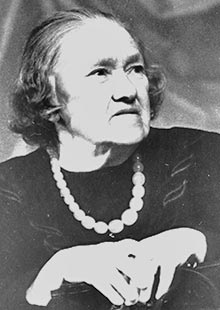
Sofiya Vasilyevna Kalistratova, also known as Sofia Kallistratova was a public defense lawyer in the Soviet Union. She defended various Soviet dissidents and from 1977 was a member of the Moscow Helsinki Group (MHG), distributing information about human rights violations in the Soviet Union.
Meirkhaim Gavrielov was a Bukharan Jewish journalist murdered in Tajikistan.

The Moscow Helsinki Group was one of Russia's leading human rights organisations. It was originally set up in 1976 to monitor Soviet compliance with the Helsinki Accords and to report to the West on Soviet human rights abuses. It had been forced out of existence in the early 1980s, but was revived in 1989 and continued to operate in Russia.
Human rights in Ukraine concern the fundamental rights of every person in Ukraine. Between 2017 and 2022, Freedom House has given Ukraine ratings from 60 to 62 on its 100-point scale, and a "partly free" overall rating. Ratings on electoral processes have generally been good, but there are problems with corruption and due process. Its rating later declined in 2023 due to the Russian invasion of Ukraine which led to the enactment of martial law in Ukraine as well as a labor code that removed many legal protection for employees and small and medium-sized companies as well as a law that that increased the government's power to regulate media companies and journalism. Since the beginning of the invasion Russia has engaged in various war crimes against Ukrainian civilians and the invasion has had a major humanitarian impact on Ukraine and it's citizens.
The SOVA Center for Information and Analysis is a Moscow-based nongovernmental organization and think tank conducting sociological research primarily on nationalism and racism in post-Soviet Russia. Currently, SOVA devotes its monitoring, research and advocacy to three projects: Misuse of Anti-Extremism Legislation, Racism and Xenophobia, and Religion in Secular Society. SOVA publishes print reports in Russian and maintains a website updating readers in both Russian and English. Its reports are often cited by Western media sources including The New York Times and The Guardian.

Ukraine was in 96th place out of 180 countries listed in the 2020 World Press Freedom Index, having returned to top 100 of this list for the first time since 2009, but dropped down one spot to 97th place in 2021, being characterized as being in a "difficult situation".
Agora is a Russian human rights group based in Kazan, Tatarstan. It provides legal advocacy for victims of suspected human rights abuses by government officials such as police, military and prison officers, with a particular focus on journalists, political activists, bloggers and Non-Governmental Organizations (NGOs). The organization was awarded the Rafto Prize for its work on 25 September 2014.
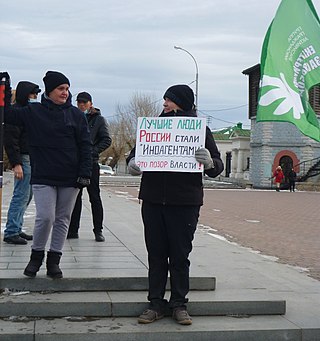
The Russian foreign agent law requires anyone who receives "support" from outside Russia or is under "influence" from outside Russia to register and declare themselves as "foreign agents". Once registered, they are subject to additional audits and are obliged to mark all their publications with a 24-word disclaimer saying that they are being distributed by a "foreign agent". The phrase "foreign agent" in Russian has strong associations with Cold War-era espionage. The law has been heavily criticized both in Russia and internationally as violating human rights, and as a tool used to suppress civil society and press freedom within Russia, particularly groups opposed to Vladimir Putin.
Most Azerbaijanis receive their information from mainstream television, which is unswervingly pro-government and under strict government control. According to a 2012 report of the NGO "Institute for Reporters' Freedom and Safety (IRFS)" Azerbaijani citizens are unable to access objective and reliable news on human rights issues relevant to Azerbaijan and the population is under-informed about matters of public interest.

The Russian undesirable organizations law is a law that was signed by President Vladimir Putin on 23 May 2015 as a follow-up to the 2012 Russian foreign agent law and Dima Yakovlev Law. The law gives prosecutors the power to extrajudicially declare foreign and international organizations "undesirable" in Russia and shut them down. Organizations are subject to heavy fines and lengthy prison sentences if they fail to dissolve when given notice to do so. These punishments also apply to Russians who maintain ties to them. Critics say that the law is unclear in many areas and can be used to silence dissent. Supporters of the bill claim that this law is vital for the preservation of national security.
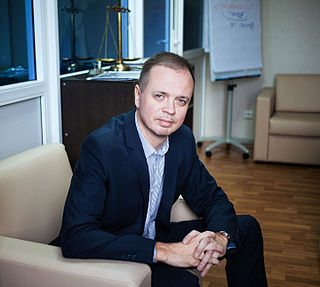
Ivan Yuryevich Pavlov is a Russian advocate and open government activist. He participated in the development of Russian federal and regional freedom of information legislation. He specializes in protecting the right to access government information in Russia, and defending citizens from ungrounded accusations of disclosing state secrets, high treason, and espionage. Additionally, he focuses on raising public awareness of the need for modern legislation on state secrets and the use of current legislation as a means of repression.
Sergei Ivanovich Grigoryants was a Soviet dissident and political prisoner, journalist, literary critic, chairman of the Glasnost Defense Foundation. He was imprisoned for ten years in Chistopol jail as a political prisoner for anti-Soviet activities, from 1975 to 1980 and then four more years starting in 1983 on similar charges.
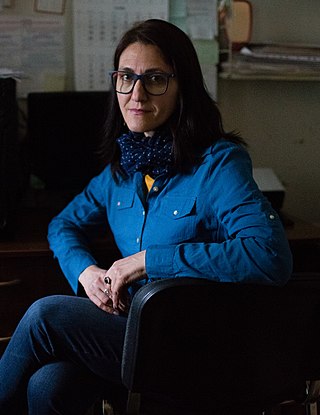
Galina Arapova is a Russian jurist, director and senior media lawyer of the Mass Media Defence Centre in Voronezh. She is an expert on Russian media law.
